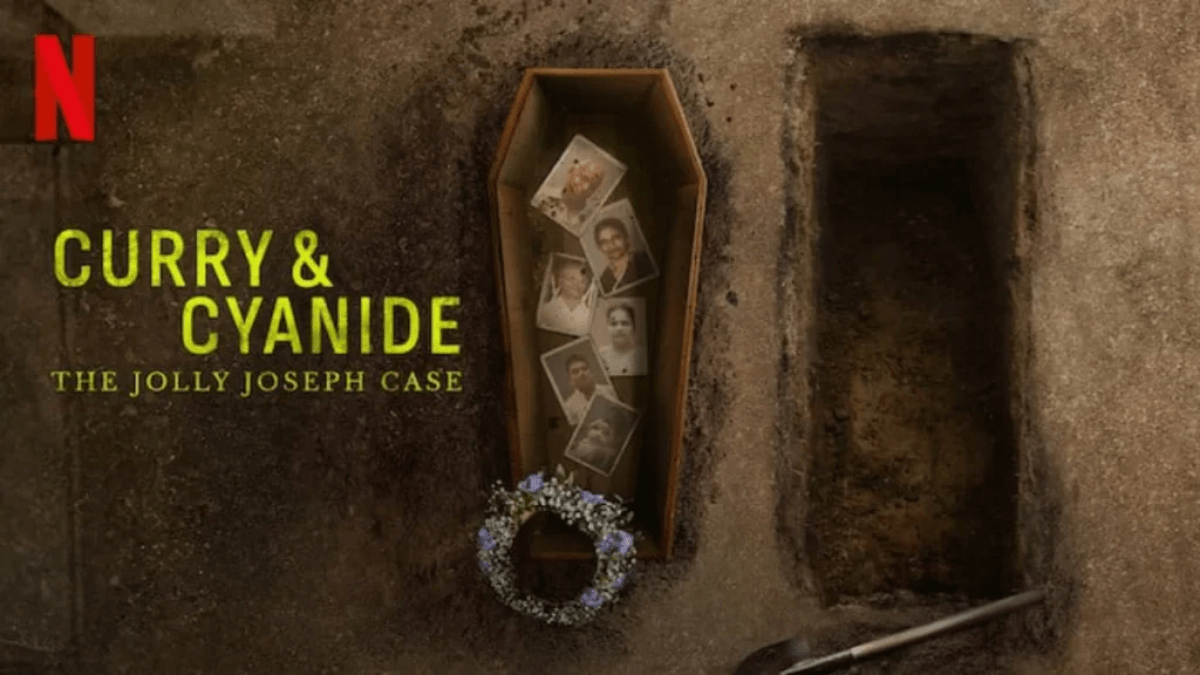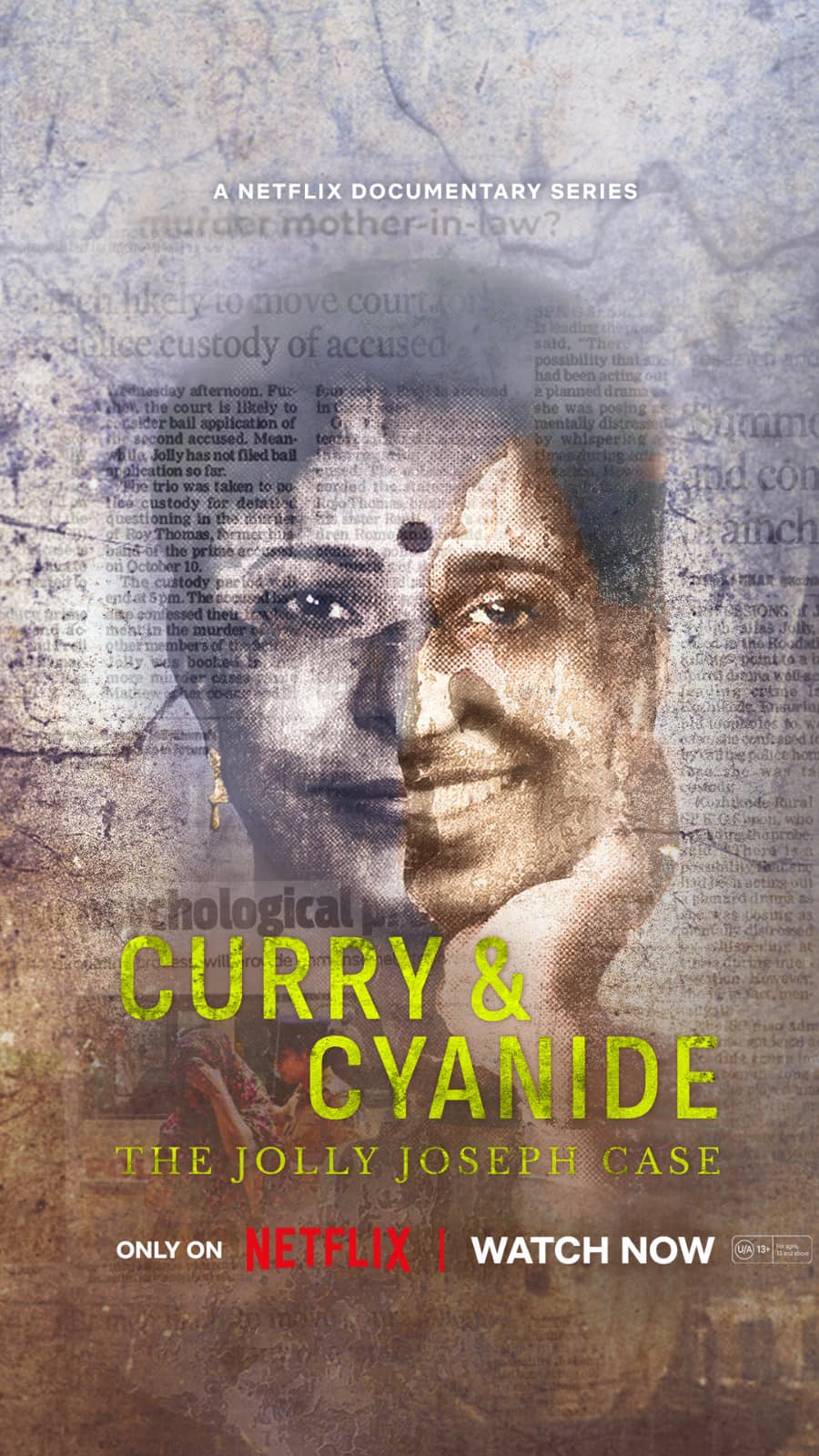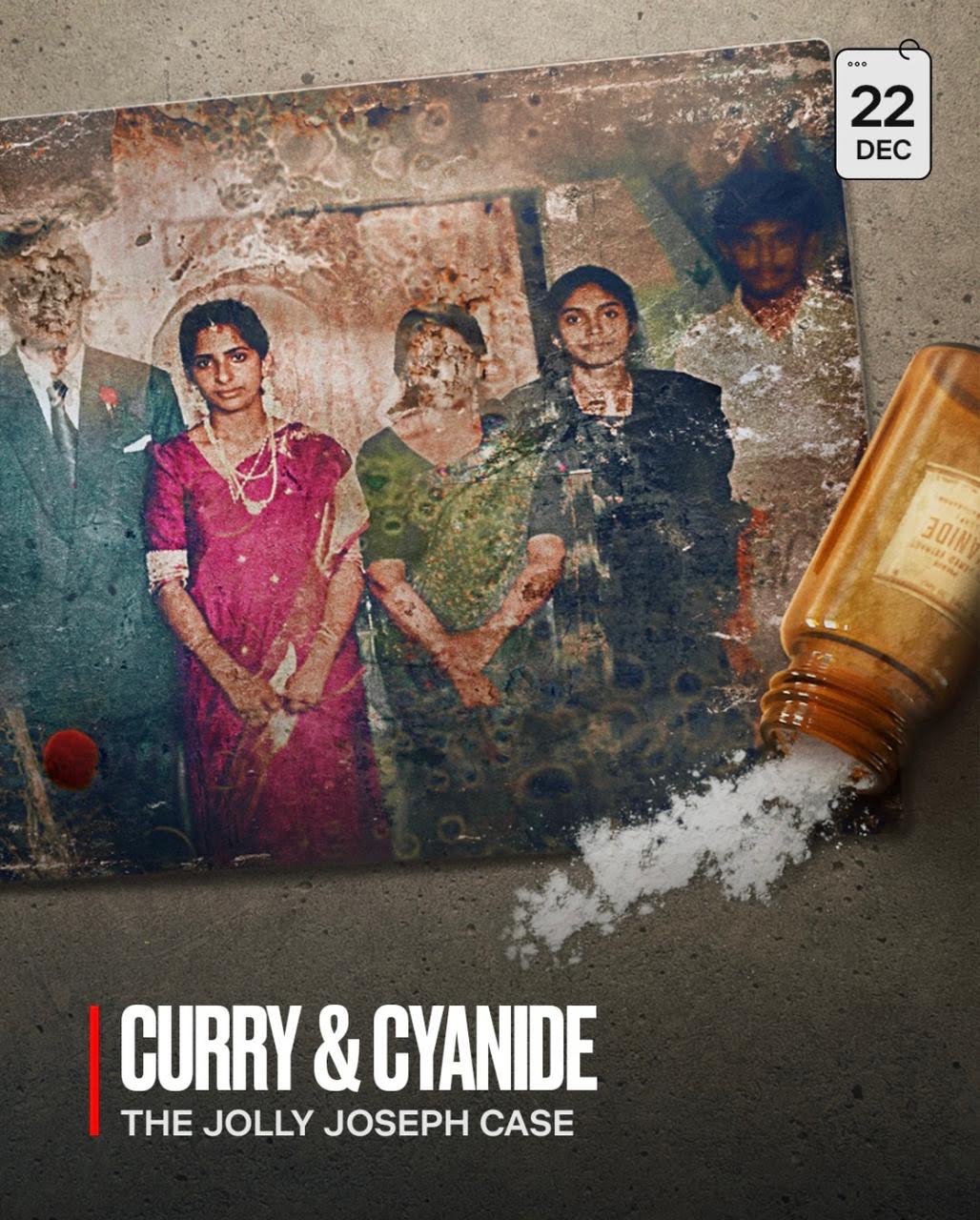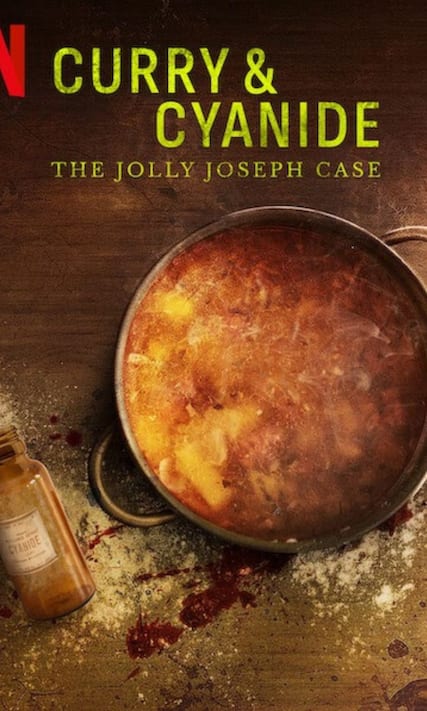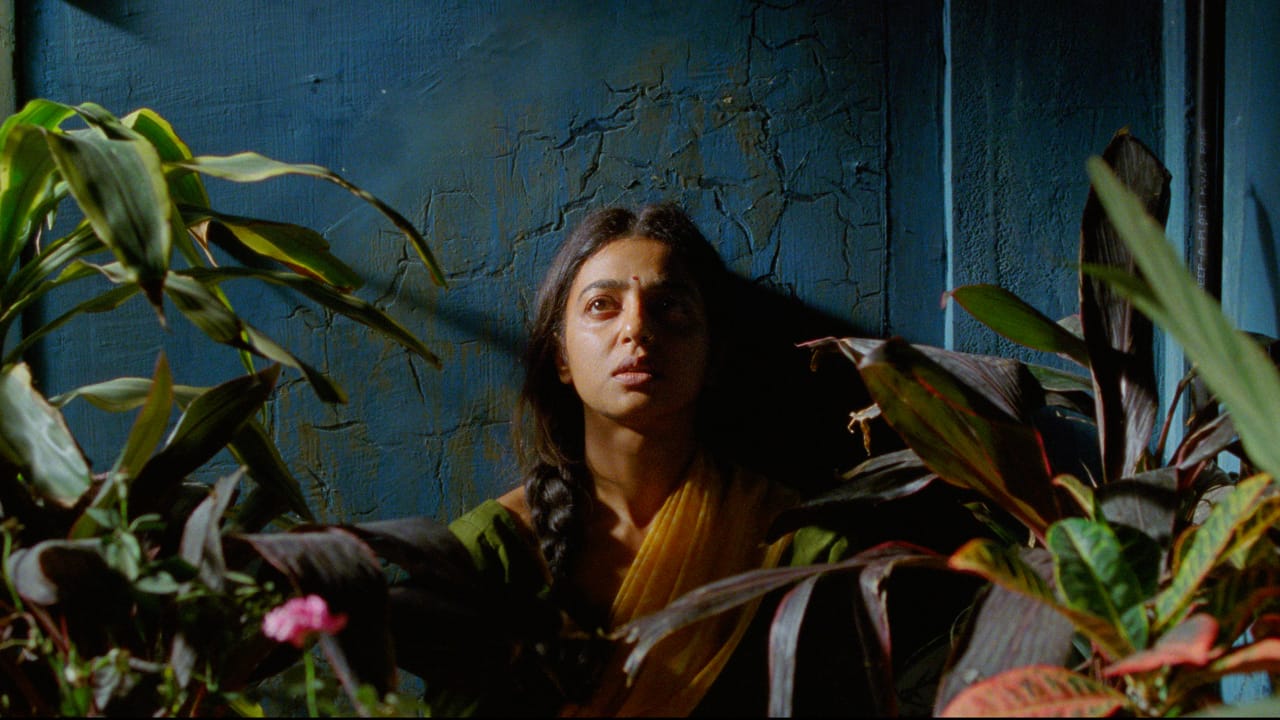Curry and Cyanide: The Jolly Joseph Case (2023) is now trending among the Netflix documentaries with its increasing viewership. This crime-based documentary was directed by Christo Tomy, the recipient of twin national awards for Kanyaka (2013) and Kamuki (2015). The documentary is based on the six cold blooded murders that took place from 2002 to 2016 in Koodathayi village of Kozikode, Kerala. The case became so popular due to the alleged strategy used by the accused, namely dissolving cyanide in food.
The documentary is based on the six cold blooded murders that took place from 2002 to 2016 in Koodathayi village of Kozikode, Kerala.
Jolly, a homemaker of 47 years is accused of murdering her mother-in-law, father-in-law, husband, relatives, and the first wife and daughter of Jolly’s second husband Shaju. Though the case is still under trial and the alleged Jolly Joseph, the daughter-in-law to the family is trying to prove her non-involvement in the case, the documentary attempts to delve deeper into the case.
The presentation style of Curry and Cyanide
Curry and Cyanide: The Jolly Joseph Case (2023) has varied highly in its style of narration which is different from the other Netflix crime based documentaries. It uses a personal mode of narration involving the main narrator, Renji Thomas, the only sister of Roy Thomas, dead husband of Jolly. She includes her memories and what she had heard from her parents and relatives about Jolly, her sister-in-law.
Her narration adds a sense of authenticity to the events recollected by her, though it is also true that all of it cannot be true. Exaggeration and addition of elements from someone who holds grudges against the culprit are not always true. Renji Thomas like her other brother Rojo, also had conflict with Jolly over the ownership of the ancestral property. Here, comes the major problem of Curry and Cyanide: it is never balanced in opinions or narration, but seems to take the quick decision on a case that is still under trial. It depicts the human desire to portray the alleged culprit and the crime without attempting to learn whether or why it happened, which becomes a major drawback of the documentary.
It depicts the human desire to portray the alleged culprit and the crime without attempting to learn whether or why it happened, which becomes a major drawback of the documentary.
It is also lacking in multiple directions, not just in narration. It leaves out the past of Jolly, her childhood and her associations. Any testimonies from her family, relatives or people from her place could have made it more balanced. It also does not answer the question as to why all her lies go undetected. Jolly, for years, successfully continued to live the lie that she is a guest faculty at NIT Calicut. None of the family members suspected her involvement in the death of her family members one by one and her forged educational certificates also go undetected.
Also, her connections with strange men after the death of her husband is not explored; the narrator Renji Thomas who might have an opinion on everything else does not have a stance on this. These suggest the conscious erasure of many of the loopholes surrounding Jolly. These bring a great deal of dissatisfaction with the viewers especially when these doubts are not clarified as to why these all go undetected.
Also, Renji Thomas does not give any explanation in this regard as well. Nonetheless, the presentation style of the narration of Renji Thomas rightfully deserves a special appreciation, her placement and conversational style conveys genuinity and captures attention.
The gendered nature of the Jolly Joseph case
The story that woman is the embodiment of infinite virtues ties her down as the divine female. Most religions in India cast a glow of divinity on women, thus attributing them with characteristics like motherly, loving, kind, patient, enduring, and so on. But as a normal human every woman or man is not equally bestowed with these qualities. Our upbringing and environment determine our behaviour and temperament to a great extent.
In the recent years, the news of married women leaving their homes for their newly found partners have been surfacing very often. And, sometimes unfortunately, these elopements are preceded by the deliberate killing of their children and/or husband. But, irrespective of the nature of the case, they assume and explicitly project the gendered aspect of these incidents. That means directly the blame is placed over the women repeatedly just because it is considered their biological “duty” to be docile, nurturing and loyal.
Also, the language used to bring out the news and, very often the headline of the news piece, are exploited to act as a sensational bait, inciting the gendered notions prevalent in the society. The same thing happened in the Jolly Joseph case as well. She was trolled more for her identity as a woman and a mother than the crimes that are allegedly committed by her.
Even now in the social media, troll reels and satire made on her are frequent and common. Here, the documentary producer and director has made use of her name currency to accumulate monetary benefits and fame without giving a thought to her side of the story. This is not to say that she can ever justify her actions if she did commit the crime, but to understand the gendered nature of reporting or talking about such news incidents. Nevertheless, now Jolly has become a household joke made by men to mock and tame their wives into subjugation.
Nevertheless, now Jolly has become a household joke made by men to mock and tame their wives into subjugation.
When viewed all at once, the reason for the success of Curry and Cyanide is nothing but the curiosity of the already obsessed audience in trying to have a closer look at the celebrated accused of the case. However, the documentary in no way gets any closer to the accused. Rather it spreads rumours and celebrates the fancies surrounding the case and Jolly. It discloses nothing new but the already available public information. Hence, Christo Tomy has craftfully marketed the ill fame of Jolly and sold it to the highest bidder.
It could have been planned in a much better way, seeking the points of view from both or different parties. This could have reduced the viewers’ displeasure caused by the lone story teller and reasoning of their narrative. There could have be another perspective in Remo, Jolly’s elder son. He was not fully aware of any of it when the incidents occurred and he was also a minor then.
Also, he only figures in a small portion toward the end and therefore, he cannot be viewed as a complete narrator. It also did not make any use of the real house or properties. The only merit is that it could sit well with the active emotional engagement of the audience for most part of the documentary.
Curry and Cyanide’s choice of words to describe Jolly is not appropriate. It is not a must watch since several documentaries are likely to follow after the final verdict is given and it could give one a better background to understand the motives of the crimes committed. The verdict could also reveal more informationthan what is already known to us. As far as the recent updates, six of the witnesses in the Jolly case have turned hostile and the accused in the case has moved a lower court in Kerala to stop the screening of Curry and Cyanide, citing the lack of evidence in the accusation. It is important to make sure this documentary does not become an influence in blindfolding judicial judgements by gathering mass appeal and power.
About the author(s)
Vidhu (she/her) is an emerging writer with Masters in English language and literature, keen on learning the politics of the world around her. She has dreams to create a career in journalism and writing, where she unburdens her self. She has a great taste for movies from varies geographical spans and pens down poetry in magical charms. She is open to projects or research centring on humanities.
